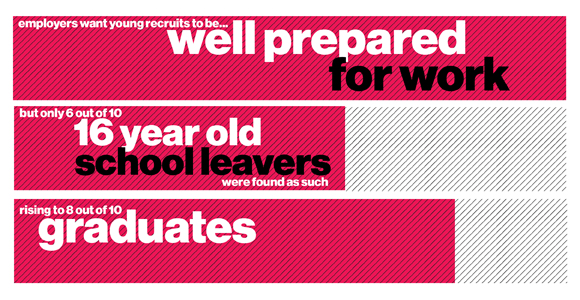Too many young people are stuck in the catch-22 situation – no work without experience: no experience without work. But their pain also means that employers risk not having the skilled workforce they need. The result? We all lose out on the full contribution these young people could make to society.
As one of the UK Commission’s graduate interns says, “If you aren’t given the chance, how are you supposed to prove people wrong?”
We know that most UK employers, particularly smaller ones, value experience above all other criteria when it comes to recruiting. But declining numbers of young people are getting experience of work while still at school, college or university; most employers do not recruit any young people; and there is a common perception that young people just aren’t good enough.
There has been much discussion on the human costs of youth unemployment. It is well-established that a delay in getting that first job does permanent damage to a young person’s prospects for sustained employment, future earnings and career progression. Studies show the effects lasting their entire working life and that the longer they spend unemployed, the worse it is. This represents a very real waste of talent that also has costs to business and our society.
There are sound business reasons why employers should open up more opportunities for young people.
Young people bring fresh perspectives and ideas to the workplace. Employers find young people willing to learn new skills and to work differently. Our research shows that almost 6 out of 10 employers recruiting 16 year old school-leavers found them well prepared for work, rising to over 8 out of 10 recruiting graduates.
Employers not recruiting young people are missing an opportunity. Young people are the workforce of the future. Where will the right skills and attitude come from when more mature people leave the workforce? By not securing a ‘pipeline’ of talent now employers risk not having the skilled workforce they need in the future. And a war for increasingly rare talent could push up wages damaging to businesses on tight margins.
We all pay the costs of youth unemployment.
Some talented young people, not recognised as such by UK employers, may find opportunities overseas. Not only will they be lost to us, but they will contribute to competition against UK businesses. For the majority who remain, many will claim benefits for longer and perhaps intermittently throughout their working lives. They will neither reach the heights nor pay the taxes that they might have.
If youth unemployment continues at current rates, by 2022 costs to the exchequer and lost output to the economy are estimated at £28 billion. That’s on top of the human and social costs.
And there is the potential knock-on effect as unemployed young people become parents. A next generation growing up in workless, or intermittently working, households will lack the role models and contacts that they need to become employable and employed. Future generations may also be lost unless we help today’s young people escape this catch-22.
For all these reasons we are calling for every UK business to adopt a youth policy.
Most companies can commit to doing at least one thing for young people in their community – perhaps giving talks in schools, offering workplace visits, mentoring a young person, hosting work experience or offering apprenticeships. Even a small action can have a big impact on the life of a young person, help safeguard the future of a business and bring greater prosperity to the UK over the lifetime of the young person and beyond.
For more information please see our reports on Youth Employment

2 comments
Comment by zack ashenden posted on
Too many young people are stuck in the catch-22 situation – no work without experience: no experience without work. But their pain also means that employers risk not having the skilled workforce they need. The result? We all lose out on the full contribution these young people could make to society.
As one of the UK Commission’s graduate interns says, “If you aren’t given the chance, how are you supposed to prove people wrong?”
We know that most UK employers, particularly smaller ones, value experience above all other criteria when it comes to recruiting. But declining numbers of young people are getting experience of work while still at school, college or university; most employers do not recruit any young people; and there is a common perception that young people just aren’t good enough.
Comment by lauren coper posted on
Most companies can commit to doing at least one thing for young people in their community – perhaps giving talks in schools, offering workplace visits, mentoring a young person, hosting work experience or offering apprenticeships. Even a small action can have a big impact on the life of a young person, help safeguard the future of a business and bring greater prosperity to the UK over the lifetime of the young person and beyond.